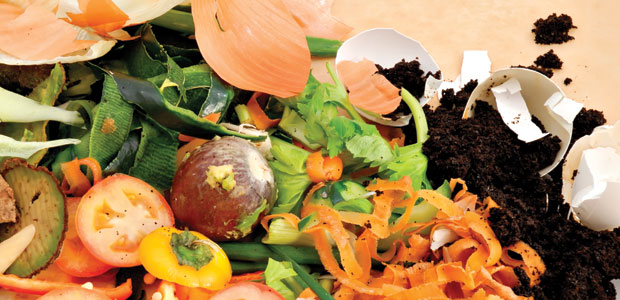Advertisement
Passionate About Compost
Gardener's gold

Composting has an effect on me unlike any other thing I do. It makes me feel virtuous to create something valuable from what many people consider mere garbage.
At the same time, it humbles me to stand peering into my compost bin, knowing that I really have very little to do with this natural process that turns my kitchen scraps, fallen leaves, and grass clippings into black gold for my garden soil and plants.
Celebrate Compost
Mark your calendar! The 13th Annual International Compost Awareness Week starts May 4 and runs until May 10, with this year’s thematic message: “The Possibilities are Endless… Compost!”
Inaugurated in Canada in 1995, this yearly event is now celebrated across Europe, the USA, the UK, and Australia as a means to raise awareness of the social, environmental, financial, and personal benefits of making and using compost.
For more information about events planned in your community, go to the website of the Composting Council of Canada, compost.org.
Make Your Own Compost: The Beginner’s Guide
While no two gardeners compost exactly alike, the basic steps are the same. Here they are:
- Build or purchase a rodent-proof compost bin. (Nearly all Canadian municipalities offer low-cost, plastic compost bins that are sturdy and rodent proof if assembled properly.)
- Place your compost bin on bare soil in an accessible spot in the garden or yard. Dig up the grass first if necessary.
- Place a layer of small twigs in the bottom of the empty compost bin to allow for air flow from the bottom.
- Never fill your compost bin with only one kind of material (such as all grass clippings or all rose bush prunings) at one time. Rather, get in the habit of layering different ingredients to ensure a healthy ratio of carbon-producing ingredients (dried flowers, dried grasses and leaves, woody stems, shredded paper, and cardboard) to nitrogen-producing ones (kitchen scraps, fresh grass cuttings, and garden greenery).
- Composting works best when the bin is at least half full. You will be amazed at how quickly an almost-full bin reduces in volume, allowing you to continue adding more composting materials as they become available.
- Size matters. With clippers, cut garden scraps into smaller pieces (no bigger than 4 in /10 cm). Chop kitchen scraps into smaller pieces, too. This will accelerate their decomposition.
- The ingredients in your compost bin should be slightly moist–like a wrung-out dishcloth. Use a hose to lightly sprinkle your compost during hot spells.
- Every few weeks, aerate your compost by using a garden fork or a specially designed compost turner to mix the materials.
- Adding a shovel full of light (not muddy), healthy soil to your compost along with a few shovels full of manure and seaweed will greatly speed up the composting process. Cut nettles are also an excellent accelerator.
- Always keep the lid closed tightly on your compost to prevent rodents from getting into the bin. If your compost gets too soggy and needs to dry out, leave the lid off for a few hours in the full sun. (Keep an eye out for animals trying to get a free lunch–except for earthworms, of course.)
- Continue adding a balanced mixture of carbon- and nitrogen-source materials.
- It generally takes between three months to a year before compost is ready to use. (I have two or three compost bins working at different stages of decomposition. This enables at least one bin to complete its cycle without my adding any new materials.)
- Your compost is ready to use when it resembles dark soil and has a sweet, earthy smell. There will also be few, if any, worms remaining as they will have completed their job of breaking down the organic materials.
- Top dress or work handfuls of compost into the soil around your plants.
The Wonderful World of Composting
It’s not just happening in Canada. All over the world, people are growing passionate about composting. It’s not just backyard gardeners who are turning kitchen scraps and garden trimmings into a concentrated soil supplement through composting.
Governments and businesses worldwide are cashing in on the compost craze. Composting is not only good for our ecology–it’s good for the economy, too.
Making Money, Not Landfills: the Business of Compost
Transforming rotting potato peels and lettuce leaves into a valuable resource that people line up to buy may sound more like a fairy tale than a business plan to some, but certainly not to International Composting Corporation (ICC, internationalcomposting.com). As one of the world’s leading innovators in the research and development of composting technology, this Canadian company knows composting is the wave of the future.
Using a unique industrial composting process that meets or exceeds all international composting standards, ICC’s composter processes between 25 and 110 tons (23 to 100 metric tons) a day of organic materials, including food waste from restaurants, yard and garden waste, and wood debris. After 21 to 35 days of processing, the compost is packaged, cured for another two weeks, and then sold to eager gardeners. ICC also produces organic fertilizer and liquid plant food.
Compost Dos and Don’ts
Honestly, I compost just about everything, including many of the food scraps the experts tell us not to compost. It’s always worked out for me. But just to be safe, it’s probably wisest to begin by following these standard lists of dos and don’ts for what to compost.
Do Compost
- vegetable and fruit scraps
- garden trimmings
- grass clippings
- leaves
- unbleached paper towels, tissues, and napkins
- hair
- tea bags and coffee grounds
- crushed eggshells
Don’t Compost
- meat and bones
- fish
- dairy products
- cooked food
- coal ash
- animal litter and wastes




